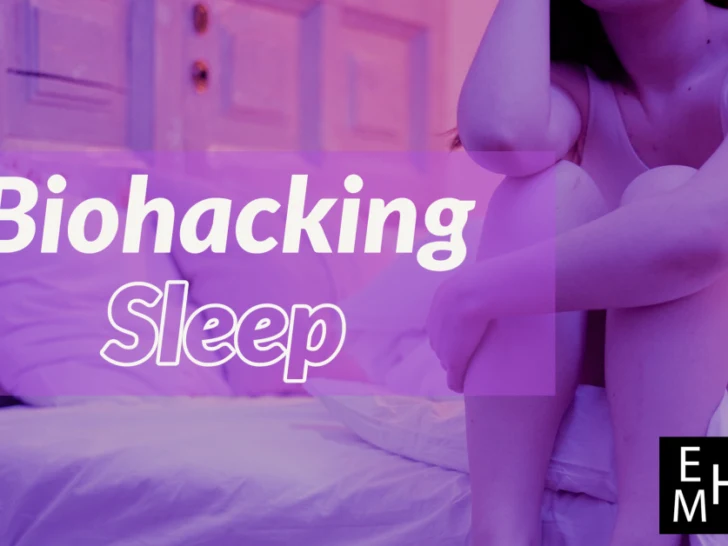Some of the links in this post are affiliate links. This means if you click on the link and purchase the item, we will receive an affiliate commission from the vendor at no extra cost to you. These business relationships allow us to keep bringing you great EatMoveHack content. All opinions remain our own.
Biohacking Sleep For a Healthier You
Biohacking sleep has become a necessary focus of mine. A few years ago I was a true insomniac. By the time I finally sought treatment, I was routinely sleeping less than 2 hours a night. Many nights I didn’t sleep at all.
Before we go any further, please give me a moment to introduce myself. I’m Kelly Kidd. I’m thrilled to be contributing to the Eat.Move.Hack. community through this guest post. If you enjoy what you read here please visit my blog as well – the Lazy Biohacker. Enjoy!
My first stop was my primary care doctor who prescribed sleep aid medication. Over the next few months, I tried Lunesta, Ambien, and Remeron. Each had their side effects like food obsession, bizarre dreams, and daytime sleepiness.
One thing they all had in common was that they created dependency and stopped working overtime. After gaining 15 lbs and still not sleeping well, I refused to try a fourth medication. At a loss for ideas, my primary doctor finally referred me to a sleep specialist. What I learned about biohacking sleep changed my life and restored my sleep without medication.
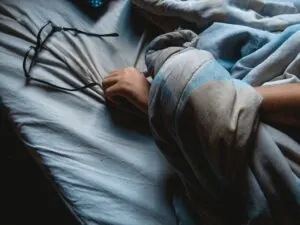
Why is Biohacking Sleep A Big Deal?
So, let’s start with a definition of biohacking before we get too much deeper into the discussion. We aren’t talking about the biohacking that involves altering your DNA or injecting yourself with chips to measure your vitals. Nothing we suggest here would be something you would see in The Matrix.
Rather, we are talking about “hacking” our bodies through the understanding, control, and management of our own biology. This involves understanding how our internal bodies are affected by external stimuli and our own behavioral choices.
The biohacking suggestions we offer here are those that will hopefully help you improve your cognitive abilities, executive functions, and general immune response.
Our cognitive performance and basic health markers have been negatively impacted by so many elements of our lives. In this article, we are going to focus on how we approach biohacking sleep to gain back some of the ground we have lost because of our environment and lifestyle choices.
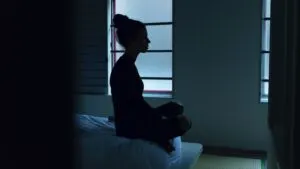
On the Rise
Sleep deprivation is on the rise. More than 50 million Americans are sleep deprived as boundaries between home and work are increasingly blurred (1). According to the CDC, the last two decades have shown increases in sleep aid prescriptions filled. (8) People are looking for biohacking sleep solutions that don’t involve prescription medication.
While women are also the highest users of prescription sleep aids, the fastest growing demographic is young people, between the ages of 18-24 yrs old (3) (8). This trend towards younger people becoming dependent on sleep aids is concerning and indicates a deeper problem.
A Form of Torture
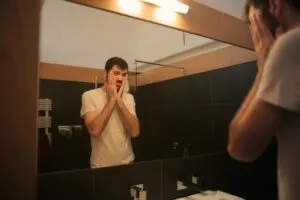
Anyone who’s suffered from insomnia would agree that it feels like torture. What they may not realize is that CIA operatives routinely use sleep deprivation as a form of “enhanced interrogation techniques”. It’s extremely effective at coaxing cooperation.
“Sleep deprivation is an especially insidious form of torture because it attacks the deep biological functions at the core of a person’s mental and physical health” (Psychology Today)
Sleep is a key biological function and without it, our mental health, physical health, and relationships suffer. Many of the health risks to sleep disturbance are widely know, but it may be the lesser-known impacts that would surprise you.
Infection & Inflammation Risk
One of the most concerning effects of sleep deprivation is the reduction of infection-fighting proteins called cytokines. We only produce cytokines during sleep. Cytokines are signaling proteins that communicate between cells. When we don’t sleep well we produce less and don’t release the ones we have making us more susceptible to infection and inflammation (4).
For this reason, sleep is a vital part of your immune system. So much so that when you’re sleep-deprived and get a vaccine like the flu shot, it’s less effective (5).
It gets worse, even relatively modest levels of sleep deprivation also increase white blood cells. This increase in white blood cells can lead to an increased level of cardiovascular risk.
Correcting sleep deficiencies can have a positive impact on how well you fight disease and respond to inflammation.
Reduced Cognitive Function

While burning the midnight oil might seem hyper-productive, research says otherwise. We are actually less effective, make more mistakes, and are less creative when we’re sleep-deprived. Our mental processes are universally negatively impacted by a lack of sleep.
We also suffer from memory loss since memory processing and consolidation happens during sleep.
“Research shows that we need good sleep to feed our high-level, innovative thinking, and problem-solving abilities.” – Sleep foundation
I saw this firsthand when I wasn’t sleeping. Besides just lack of patience, I had a hard time focusing, trouble remembering basic information, and was making careless mistakes at work. As annoying as all of that was, it was the reduced reaction time that almost led to a car accident that finally convinced me to seek treatment.
Had I known that biohacking my sleep would be so easy I would have done it a lot sooner.
Behavioral Hacks for Restful Sleep
-
Correct Mineral Deficiencies

There are several vitamins and minerals that when deficient, can negatively impact sleep. Of all the likely culprits, magnesium deficiency is something worth exploring.
Magnesium is the fourth most abundant element in the human body. It’s involved in over 300 metabolic reactions and 600 enzymatic functions in the body. Over 40% of the population is deficient in this important mineral. One of the most important functions of magnesium relates to sleep.
“Magnesium plays a role in supporting deep, restorative sleep by maintaining healthy levels of GABA, a neurotransmitter that promotes sleep. Research indicates supplemental magnesium can improve sleep quality, especially in people with poor sleep. Magnesium can also help insomnia that’s linked to the sleep disorder restless-leg syndrome.” – Psychology Today
In my personal battle with insomnia daily supplementation was recommended and proved effective. In addition to helping me sleep, it also helped me restore normal vitamin D levels since magnesium is required for the metabolism of vitamin D. Magnesium has many other positive impacts in the body, read more about them here.
If you want to add some magnesium supplementation into your routine, check out this great product from Thorne.
-
Use Light to your Advantage
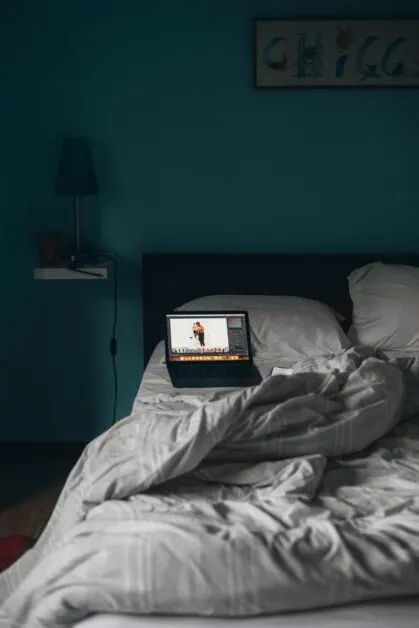
You’ve probably heard about the sleep-disrupting nature of blue light from TVs, computers, and cell phones. Blue light tricks the brain into thinking it’s daytime which is time to be awake.
That said, any light in the evening can be disruptive to some extent. A few hours before bed reduce light in your home by lighting candles and using lamps with incandescent or warm bulbs.
Reduce electronic use and adjust the ones you can’t resist to ‘night mode’ or enable any settings that block blue light. If your phone doesn’t have a night mode setting, you can download a blue-blocking app. If you need to work on your computer but can’t adjust the setting, consider investing in blue light blocking glasses. You can also add blue-blocking filters to your prescription lenses.
In the morning open your blinds and curtains when you wake up. Even better, get up and go for a quick walk outside. Soak in the sun.
Your brain stem is the responsible for the transition from sleep to waking….let’s make things easy for your brain early in the morning. Get up and get out.
Natural light is the perfect spectrum to trigger wakefulness. Sunshine had been shown to have a positive effect on restoring your circadian rhythm. It reminds your brain of the difference between daytime wakefulness and nighttime sleep.
-
Reduce this Stimulant
Everyone knows the stimulating effects of caffeine can make it hard to fall asleep. What you may not know is all the places caffeine might be hiding and how long it takes it to leave your system.
Caffeine is a stimulant that can cross the blood-brain barrier and interfere with adenosine and interfere with sleep. Although the metabolic process of caffeine is well known how long it takes to clear your system varies greatly.

Factors like body weight, medications, medical conditions, and lifestyle choices can impact the half-life of caffeine. For example, heavy smokers clear caffeine in almost half the time as non-smokers. Pregnant women keep caffeine in their bodies for up to 15 hours longer. Caffeine is processed in the liver so liver health can be a factor as well (5).
In addition to uncertainty about how long caffeine is in your system, many of us are ingesting caffeine from multiple sources. Some naturally occur like dark chocolate and tea. Other products like breakfast cereals, gums, and pre-workout supplements have caffeine added. Caffeine from multiple sources can have an additive effect and many of us are consuming more than we realize with our grande lattes and 16oz iced teas.
For me, any caffeine after lunchtime impacts my sleep. Reducing caffeine from all sources made a tremendous difference in my ability to fall asleep. That also meant no dark chocolate in the evening and watching my servings of iced tea throughout the day.
A Few Extra Hacks That You Can Use to Optimize Your Sleep At Night
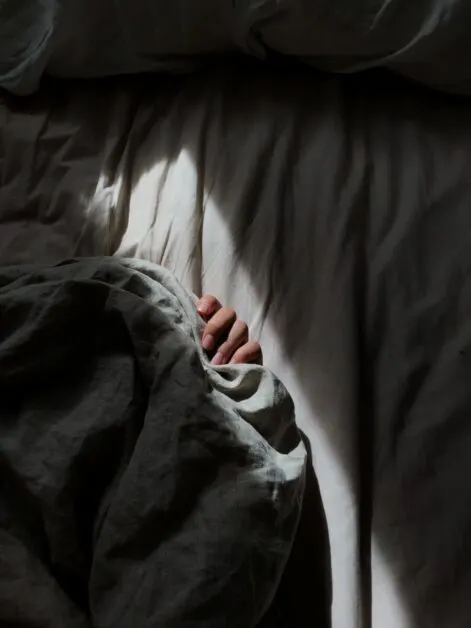
Your bedroom should be comfortable, quiet, dark, and cool. Besides a comfortable mattress, nice linens, and soothing colors, here are a few other ways you can biohack your sleep.
- Body temperature – When we sleep our body temperature lowers. By lowering the ambient temperature in the room you can trigger that response.
- True Darkness – Besides blackout curtains and blinds that block out light, also look around the room for other sources of light. Phone chargers, clocks, TVs, and other electronics often emit blue and green lights that trigger wakefulness. I cover all lights in my bedroom with electrical tape.
- Neck alignment – Many of us are living our lives in forward-leaning postures during the day. This creates stress on your neck and shoulders. A cervical alignment pillow can help correct this misalignment when you sleep and make sure your airway is in a neutral position. It even eliminates snoring for some people. The one I linked works for both back and side sleepers.
- Spa Feel – Although scents are highly personal, certain essential oils are known for promoting sleep. Lavender, vanilla and rose, and geranium support sleep for most people. That said, other scents like sandalwood and citrus can also be relaxing for some people. My favorite oil blend is Chill Pill and I use the Breathe diffuser because it has several timer settings and you can turn off the light.
- Oxygen Rich Air – Oxygen producing plants are particularly helpful during sleep to increase the oxygen in the room.
- Minimalist design – Your bedroom is a space where less is more. Think like a hotel room, only the essentials and things that bring you peace. Remove any clutter or reminders of things undone in your room like unfolded laundry. Remember, those things trigger your brain to spin and be active.
Mindfulness Meditation to Reduce Stress
In order to sleep, our mind and body have to slip into a relaxed state. Blood pressure and heart rate lower, breathing slows, and muscles relax (6). This calm state is in stark contrast with the hyper-aroused state we experience during the day.
The problem is, our high-stress lives are simulating micro emergencies that provoke a ‘fight or flight’ stress response. Once activated, heart rate increases, muscles tense, and our brain races… the exact opposite of sleep.
“Five years ago, scientists tested this theory and published their results in the Journal of Sleep Behavior. They found that people with chronic insomnia had elevated Sympathetic nervous system activity.”- Pzizz

Basically, we’re spending too much time in the ‘flight or fight’ state governed by the sympathetic system, and too little time in the ‘rest and digest’ state moderated by the parasympathetic system. These two systems are the yin and yang that can give us heightened alertness in one moment and peaceful, restorative rest in the next.
People who have trouble falling asleep don’t transition well between these states. That’s why mediation, yoga, and mindfulness (some of the oldest tools for biohacking sleep) have been shown to be very effective. You’re refining your ability to trigger the “rest and digest” parasympathetic nervous system.
You don’t fall asleep doing yoga or meditating, you just train your brain how to transition to that relaxed state. Another simple way to coax the parasympathetic nervous system into control is through relaxing music.
Music Might be the Key to Relaxation
Studies have shown that relaxing music has a direct effect on the parasympathetic nervous system by inducing Delta brain waves, the same ones that occur when we sleep or meditate (7). Researchers at Stanford University went a step further and said that “listening to music seems to be able to change brain functioning to the same extent as medication.” I’ve found music to be very relaxing, but it took me a while to figure out which music worked best for me.

My favorite ‘fall asleep’ music is classical music or the sounds of crashing waves. They work as well on a plane as they do in the bed.
If you really want to find a pure state of relaxation then consider the use of binaural beats. You can find binaural beats on all major music streaming services. You will want to look for the beats tuned for sleep.
These beats, through the use of theta waves, will trigger the part of the brain (cerebral cortex) associated with relaxation.
Here is a great quote from the Brain-Computer Interface Laboratory on the use of binaural beats – “The results showed that theta activity was induced in the entire cortex within 10 min of exposure to the stimulus in the experimental group. Compared to the control group, theta activity was also induced at the frontal and parietal-central regions, which included the Fz position, and left hemisphere dominance was presented for other exposure durations. The pattern recorded for 10 min of exposure appeared to be brain functions of a meditative state. Moreover, the tension factor of BRUMS was decreased in the experimental group compared to the control group which resembled the meditation effect. Thus, a 6-Hz binaural beat on a 250 Hz carrier tone was suggested as a stimulus for inducing a meditative state.”
Audio Books Might Bore You to Sleep (in a good way)
Although studies focused on music, audiobooks like those found on Audible can also be sleep-inducing for some people. Personally, books about history and math put me right to sleep but books about business or nutrition keep me engaged, and not sleepy. Find the topics that bore you, and download those:)

Here are my three favorite ‘fall asleep’ books
- A Short Account of the History of Mathematics
- A Philosopher’s Toolkit – How to be the Most Rational Person in the Room
- Bedtime Stories for Stressed out Adults
- Bedroom Basics
On average we spend about 230K hours of our life either sleeping or trying to sleep. Unfortunately, the place where all this happens, or doesn’t happen is often an afterthought.
Your bedroom isn’t just about comfort, it’s about sending signals to your brain that it’s time to set the worries of the day aside and settle in for a good night’s rest.
Biohacking Sleep Success by the Numbers
So, to be successful in biohacking sleep, focus on the numbers. You should strive to hit some goals centered around numbers:
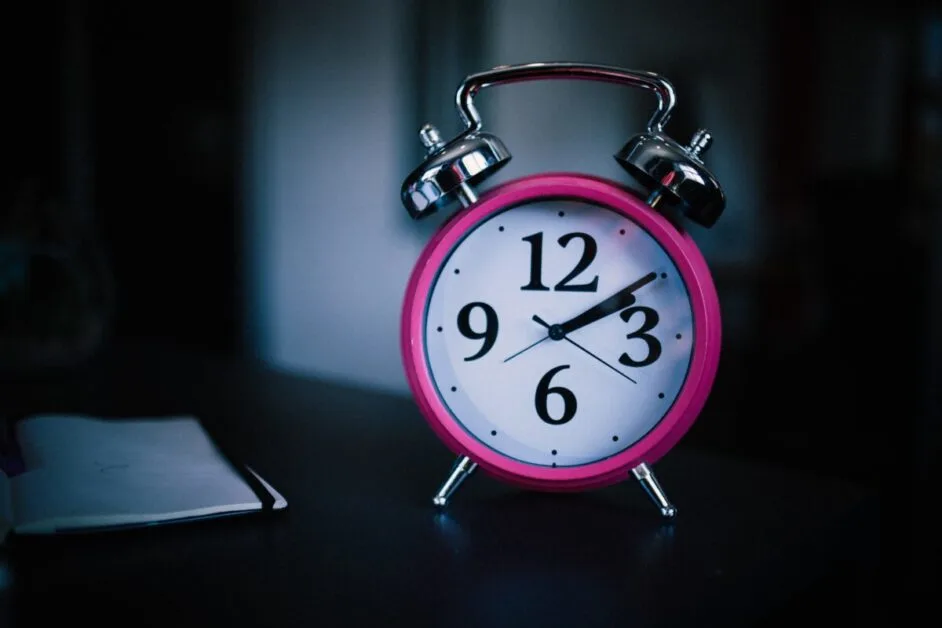
- Head to bed each night at the same time. Rather than just an alarm for waking, use an alarm to send yourself to bed;
- Try to rise from bed at the same time each day as well. Don’t get too aggressive and move your waking schedule from 7 am to 5 am straight away. Rather, if you want an early rise time slowly work yourself backward over a few weeks from 7 am to 5 am. Once there, stick to it;
- Try to have at least 7 hours between your set bedtime and your set waking time;
- Cut off caffeine consumption at least 8 hours before your set bedtime;
- Avoid alcohol within a few hours of sleep; and
- Have your last meal a few hours before bedtime as well.
Resting is OK
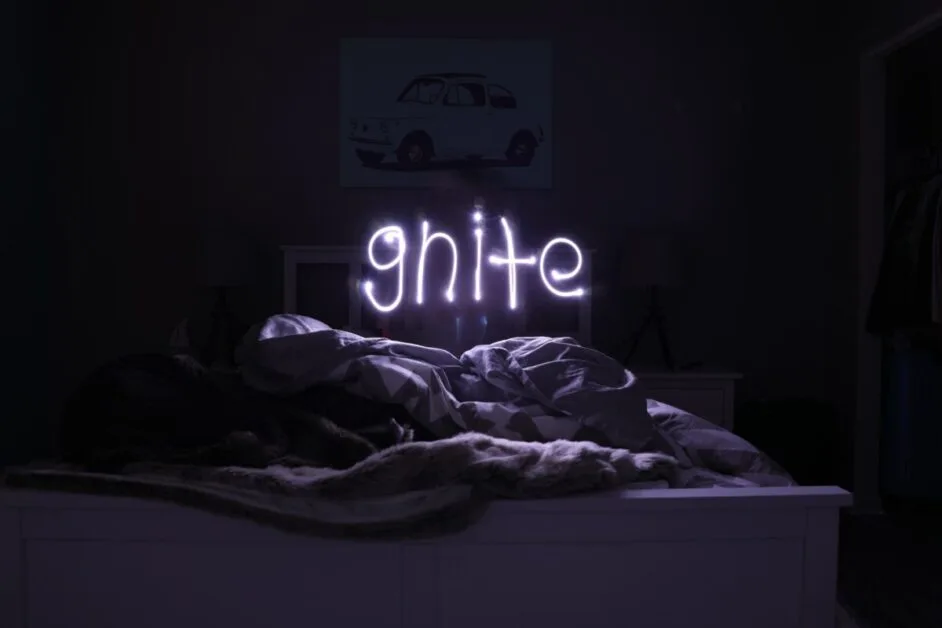
It took me three weeks after meeting with the sleep specialist to begin sleeping again. That was after months of struggling to sleep with the help of prescription sleep aid medications.
Of all the advice he gave me, the best tip was changing my attitude about sleeping. He looked at me dead in my eyes and said, “Stop stressing about sleeping. When you’re in bed you’re resting, even if you’re not asleep. You will sleep well again if you follow my advice.”
It sounds simple and easier said than done, but it gave me permission to embrace that the act of resting was ok, even if I couldn’t sleep. This mindset immediately reduced anxiety which is the enemy of sleep. My mantra when I can’t sleep is, “I’m resting, my mind and body are resting.”
As you make these changes towards biohacking sleep, be patient with yourself, and remember that you don’t have to change everything at once.
To Learn More About How to Hack Your Way To Better Health Check Out These Articles:
Essential Biohacking Supplements

